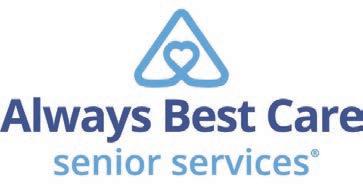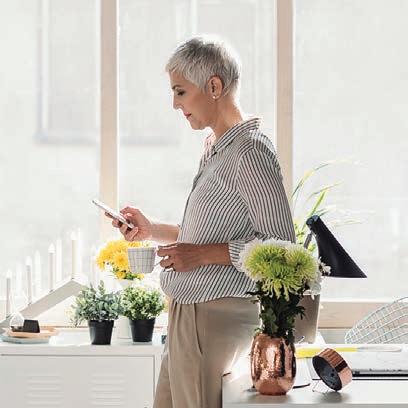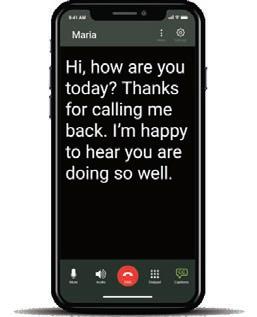
9 minute read
Lifelong Learning
Lifelong Learning Enriches Mind, Body and Soul
Local Entities Offer a Variety of Programming
As people now are living longer, growing older means we often can continue to thrive and enjoy life for many more decades than previous generations experienced.
In the United States, the average life expectancy is 76 years for men and 81 years for women. More people are living to be 85 years old and older, and the number of Americans living to be 100 or older continues to climb.
With more good years – and even decades – ahead, we have the opportunity to continue to learn new things, stay physically active and be socially engaged. And such life enrichment helps us remain healthy and productive in our elder years. Lifelong learning and life enrichment feeds and nurtures our physical, intellectual, social and spiritual wellness. Here in Western North Carolina, several institutions offer high-quality, life-enhancing programs for older adults. By their very nature, all of these programs offer opportunities for socialization, volunteering, community building, life planning and networking. They can broaden your world, open your mind to new possibilities for your life and ensure your upcoming years are rich and meaningful.
BLUE RIDGE CENTER FOR LIFELONG LEARNING (BRCLL) (828) 694-1740 | BRCLL.COM
BRCLL offers a full slate of enrichment and educational programming. Participants can select from courses on a wide variety of topics including US, international and Appalachian history, current affairs, technology, literature
and more. The program also hosts occasional brown bag lunches on various topics and has launched a new series called “For Your Health” which brings in various medical professionals to discuss topics related to healthy aging. There is a one-time lifetime membership fee to receive a catalog of classes three times a year.
LIFE@WESTERN CAROLINA (828) 227-7397 | LIFE.WCU.EDU
A program of Western Carolina University (WCU), LIFE@ offers noncredit classes for adults 50 years old and older. Courses range in topics from history and culture to health and science to geopolitical and legal issues. Current and retired WCU faculty, as well as other experts in their fields, teach classes. Membership in the program includes 24 weekly sessions from September through April.
OSHER LIFELONG LEARNING CENTER (OLLI) (828) 251-6140 | OLLIASHEVILLE.COM
A nationally acclaimed learning community for older adults, the Osher Lifelong Learning Center at UNC-Asheville offers opportunities for lifelong learning, leadership, community service and continued growth in a variety of settings. Founded in 1988 as the North Carolina Center for Creative Retirement, OLLI’s programming includes intellectual and cultural pursuits as well as social, physical and practical life courses such as life transition and retirement relocation planning. OLLI’s College for Seniors (CFS) program offers more than 350 courses in four terms every year.
There's No Place Like Home... Always Best Care Can Help You Stay There.

Affordable, Compassionate In-Home Care
• Personal Care Assistance • Alzheimer's/Dementia Care • Transportation • Light Housekeeping • 2-24 Hour Care • Meal Preparation • Medication Reminders • Companionship • Skilled Nursing Services NEW!
Call Us Today for a FREE No Obligation Care Consultation.

Ask Us About Our NEW Balance Tracking & Fall Risk Assessment System!
Contact Us Today! (828) 676-2939 • AlwaysBestCareWNC.com
Embracing Technology Helps You Stay Independent How Different Devices Promote Health and Happiness

In our 21st-century world, technology is woven into every part of our lives and has become even more important during the pandemic to help people stay connected. For older adults and those caregiving for loved ones, the realm of devices and technological tools that can help with maintaining independence and a good quality of life is growing every day. Here’s a sampling of just some of the many gadgets that can make life easier and more enriching:
Tablets and E-readers
With screens that are larger than smartphones and portability that desktop computers lack, tablets – when connected to the Internet through Wi-Fi – can help provide easy access to bank accounts, investments, financial information and health records. They also provide a handy way to surf the Web and stay connected with friends and family through social networking sites like Facebook. Through video chatting platforms like Zoom, WhatsApp, Skype and Google Hangouts, people can combat loneliness and isolation. These platforms also help individuals take care of business with professionals such as medical providers who offer telehealth services. E-readers like Kindles, Kobos and NOOKs are lightweight, have the ability to make words appear larger and can provide virtual libraries of books, magazines and other reading materials at the touch of a fingertip.
Smart Speakers
Like having a virtual assistant who does what you say, smart speakers like the Amazon Echo and Google Home devices also use a Wi-Fi connection to respond to requests for information and more. Users give voice commands to make the devices play music and games, set timers, make lists, get the weather, control connected devices such as thermostats and lights, order products from select retailers, turn televisions on and off and much more.
Video Gaming Consoles
By playing video games, you can have fun while flexing your mental muscles, helping your memory, improving your dexterity and stimulating your mind. And in addition to the action, adventure, role-playing, simulation and puzzle genres, there are games that virtually mimic playing sports and doing exercises that can help with maintaining physical activity, balance and strength. Games are also available that allow the player to connect with others online, offering a virtual avenue for additional social interaction.
Healthcare-Related Devices
Medication-dispensing systems can remind users to take their medicine and can send alerts if a dose is missed. Battery-powered devices called personal emergency response systems (PERS) – or medical emergency response systems – typically can be carried in a pocket or worn around the neck or wrist and allow the user to call for emergency help with the press of a button. Vital health data such as someone’s heart rate, oxygen levels, blood pressure, blood glucose and more can be measured and collected through wearable health monitoring sensors. Wireless-enabled wearable activity trackers like those made by Fitbit and Garmin can help measure daily physical fitness, such as steps walked or climbed, sleep quality and heart rate.
Through an ever-growing number of assistive devices, technology can offer life enhancement, peace of mind and help with remaining independent at home with less worry and more fulfillment.
Now with capptioning.
Announcing the new CaptionCall app for iPhone® Connect to everyday life using CaptionCall on your iPhone® . Easy-to-read captions of the conversation help people with hearing loss communicate better anywhere, any time.


www.CaptionCall.com
Maximizing Your Time with Your Doctor How to Get the Most Out of Your Appointments with Healthcare Providers
Time with your doctor can be limited these days. Most primary care physicians see more than a dozen patients a day and spend on average 25 minutes or less with a patient during a typical office visit. But with some preparation and planning, you can maximize time with your healthcare provider and get more out of your appointment.
Explore Telehealth Options.
During the pandemic, many healthcare providers have begun offering more telehealth options to address patient needs. When contacting your healthcare provider, find out if such telehealth options as virtual appointments through online videoconferencing or phone calls are available and if they are a good fit for your particular health situation.
Share Medical Records and Test Results Before Your Visit.
By making sure your doctor has your previous diagnostic work prior to your visit, your healthcare provider has the opportunity to gain important background information about your medical situation before seeing you in person.
Get to Your Appointment Early, but Be Prepared to Wait.
Arriving about 15 to 20 minutes before your appointment will give you adequate time to fill out paperwork, go to the bathroom and take care of other check-in items. By getting to the appointment early, you ensure your actual appointment time with your healthcare provider is not taken up with these other tasks. Even if you arrive early, you may still have to wait to see your doctor, so allot yourself plenty of time for the appointment.
Don’t Go Alone.
Having a friend, loved one or hired advocate with you during an office visit gives you another set of eyes and ears. Ask your companion to take notes or consider asking your health care provider if he or she is OK with you making an audio recording of the visit for your future reference. Your appointment buddy can be a good sounding board and also may be able to offer insight to the doctor about any health issues you are having.
Take a List of Your Medicines and Supplements.
Rather than relying on memory, take a list of your prescription and over-the-counter medications, supplements, vitamins, herbs, nutraceuticals and their dosages. Include how frequently you take them. Bring them in their prescription bottles or store packaging if that’s easier for you. By accurately sharing with your medical provider what medications and supplements you are taking, how much and how frequently you are taking them, you lessen the chances of negative drug interactions.
Summarize Your Medical History.
Have in hand a summary of your allergies, surgeries, vaccinations, family medical history and diagnosed conditions.
Be Specific and Bring a Written List of Your Medical Concerns.
Before your visit, list your health concerns, questions and symptoms and prioritize them in order of their importance to you. Invite input from your loved ones. Take three copies to your appointment – one for you, one for your physician and one for your health advocate.
Clarify Your Doctor’s Recommendations.
Ask questions, repeat back what your doctor says and ask for written details about your treatment plan. Find out if there are warning signs you need to watch for with your condition and possible medication side effects and interactions. Clarify next steps about your treatment and find out the best way to reach your physician before, during and after regular office hours in case you have questions or concerns.
Stay Positive, Follow Your Healthcare Plan and Pay Attention to Your Body.
Having a good attitude about your well-being, your healthcare providers and your doctor’s visits helps support your health and wellness. Follow your treatment plan to maximize results. Don’t wait to report changes in your condition with your provider. Instead of seeing medical appointments as burdensome, embrace the attitude that you are part of a healthcare team that is helping you age well and stay healthy.
THERE’S NO PLACE LIKE HOME.
Pardee Home Health offers a full range of medical services, including skilled nursing, social services, therapy, disease and medication management, respiratory care, diabetes, wound care, and falls prevention. What’s even better? We provide these services 24 hours a day, 365 days a year, all in the comfort of your own home.

Pardee Home Health 828-692-1846
SERVING HENDERSON, BUNCOMBE, TRANSYLVANIA, RUTHERFORD, AND POLK COUNTIES PARDEEHOSPITAL.ORG










